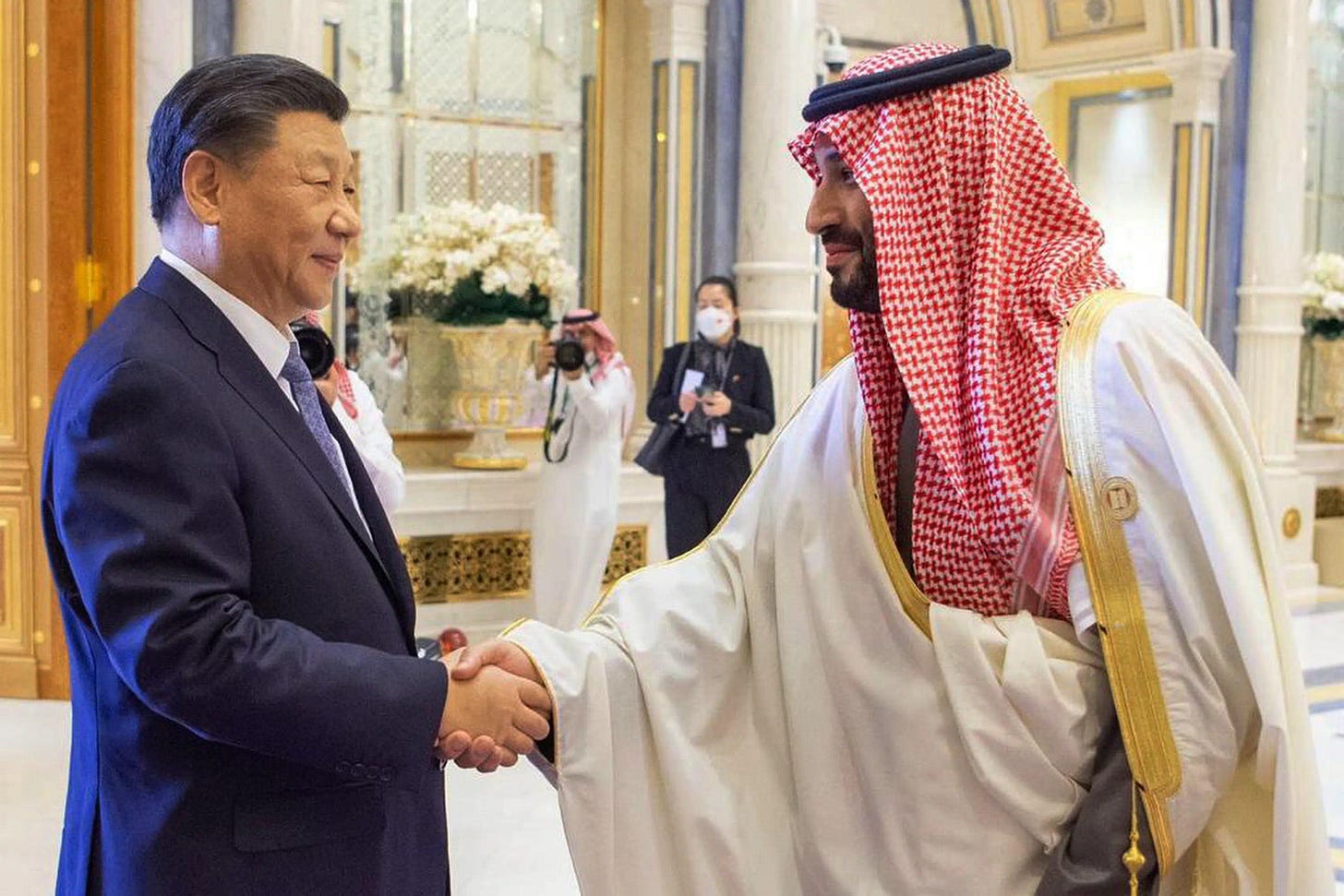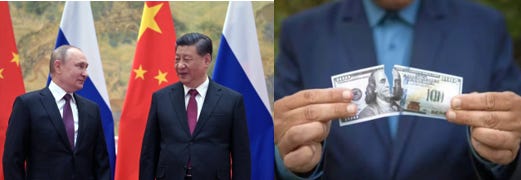The New World Order
America is losing and China is winning. To be fashionable, call that “the bottom line”, or the “take-away” from reports about the battle between the world’s democracies and the founders of a New World Order. The public statements emitting from last weekend’s meeting of the G7 industrialized democracies do not reflect what four-star General Jack Keane (Ret.)[1], calls “the very private portions of the summit meeting. It is at those meetings, off-camera, that the democracies, in his words, “Are trying to come to grips with the very harsh reality … that they are losing influence to Russia and China, especially China.” That loss is obvious in Africa, Latin America, South Asia and the Middle East.
From those private meetings emerged a tough-talking and unusually detailed public communiqué condemning Russia’s “war of aggression against Ukraine”, reminding China to uphold “the purposes and principles of the UN Charter”, and stating strong opposition to “any unilateral attempts [by China] to change the status quo by force or coercion.” Few dictators have been known to surrender to a communiqué.
Widely noted, too, was President Biden’s decision, after the usual long lag between a request and its granting, to allow other countries to train Ukraine’s pilots on F-16 fighter jets, and permission for countries to sell those warplanes on to Ukraine. Details and dates to be determined, presumably in time to affect events on the ground in Ukraine.
Talking The Talk
Ignore contradictory signals. Talk of using trade as a weapon to constrain Xi Jinping coincides with visits to Hong Kong by America’s leading industrialists to discuss amping up their investments in the People’s Republic. Talk of EU action to reduce economic involvement with the communist regime coincides with a visit by the President of the EU’s only nuclear power, accompanied by a gaggle of French businessmen, to assure Xi Jinping that as far as France is concerned, Taiwan is a faraway country (if it is indeed a country) of which he and Europe know nothing. Talk of standing with Ukraine coincides with a refusal to provide weapons that might do direct damage to the Russian homeland, or the most modern tanks.
In America, President Biden talks the talk of resisting the New World Order but is not exactly walking the walk. In real terms, miliary spending is giving way to the greening of America and an expansion of the welfare state. In Afghanistan, America demonstrated to its allies the sometime nature of its commitments and its lack of skill in extracting itself from a situation that had not produced a single American casualty in almost two years. This, after a previous administration had watched Syria’s Assad cross a red line by using chemical weapons and done nothing to a ruler now regaining acceptance from neighboring states as a desirable associate. At the Geneva conference table, a desperate US Secretary of State is attempting to renew talks with a stand-offish China furious with the United States for shooting down its spy balloon. This is not to deny that Biden has supported Ukraine in defense of its territory; it is merely to point out domestic policy underpinnings for a sustained battle against the New World Order is not in place.
Leadership Gone Missing
As its allies survey the situation in the United States, they see a nation bitterly divided, with a vast majority believing it is heading in the wrong direction. They see a nation about to be faced with two choices.
One is a clearly ageing President who, protected by a press afflicted by Trump Derangement Syndrome, dare not hold a press conference or emerge from his basement to conduct a traditional campaign. Or voters can select an egomaniacal former President fresh off a triumph in a confrontation with CNN that recalled his glory days to the constituency that matters, voters in the Republican primary. Foreign countries watching this match-up have an added worry: by the time Biden renews his lease on the White House, or shortly thereafter, they will see a President Kamala Harris sitting in the Oval Office.
So we have a democratic coalition belatedly confronting the reality of a rival coalition establishing a New World Order to minimize its, and especially America’s ability to affect world affairs. The new axis already has de facto control of South China Sea trade routes through which pass 40 per cent of world trade. To which Xi recently added to the power to block the movement of goods by establishing friendly relations with Iran and Saudi Arabia,
the latter headed by a Crown Prince whom Biden called a “pariah” and who responded to Biden’s request that OPEC increase its oil production by reducing it. If the conflict between the US and the PRC gets hotter, the President of China would have more influence over the policy of the OPEC cartel than would the President of the United States.
Weaponized Dollar Threatened With Dethroning
If the axis of the New World Order has its way, King Dollar will be dethroned – lose its position as the world reserve currency, a status the greenback earns by virtue of its size and economy’s openness. About 60 per cent of official foreign reserves are held in dollars; 80 per cent of financial market transactions are in dollars. This demand for dollars, driven by what The Economist calls “the supply of safe assets available to dollar investors”, enables America to sell dollar-denominated bonds on favorable terms as it continues to churn out deficits that require it to fill the gap between income and outgo.
Xi, Putin & Co. know that America’s ability to weaponize its dollar gives it a major weapon against the New World Order, a weapon that is making life difficult for Putin by restricting his access to dollars. Xi is eager to replace the dollar with the yuan by increasing the acceptability of China’s currency in global transactions, but is unwilling to surrender control of the value of his currency or the flow of capital. The value of any investment in China is no more nor no less than what the authorities decide it to be.
What Xi can do is switch more of China’s bilateral trade into yuan. He is delighted the his new best friend is willing to accept yuan rather than dollars for Russian oil. Pakistan, desperately short of dollars, is also seeking a long-term deal to pay in yuan. Russia will accept yuan from Bangladesh in payment of $110 million due for a nuclear plant, while Brazil now accepts trade settlements and investments in yuan through a payments system equivalent to the one from which Russia is barred.
Whether the latter was due to promises Xi made to Brazilian president Luiz Inácio Lula da Silva (Lula to his constituents) when the latter visited China in April we cannot know. We can guess that the pomp and circumstance laid on by China to announce its increasingly cordial relationship with the largest country in South America was visible to other South American countries. As was the deal between Russia and Chile for the development of nuclear energy. R.I.P. the Monroe Doctrine, President James Madison’s 1823 declaration that foreign powers “should consider any attempt on their part to extend their system to any portion of this hemisphere as dangerous to our peace and safety.”
Hail To The EV, Maybe
So far, King Dollar remains on its throne. Last year, trade in yuan accounted for less than 2 per cent of global trade according to Charles Schwab, a leading financial services firm. But America’s position in the new world of the electric vehicles the administration is subsidizing into existence while attempting to toss the fossil fuels business into the scrap heap of history is not quite as comfortable. China refines 68, 40, 59 and 70 per cent of the world’s nickel, copper, lithium and cobalt, all essential to the manufacture of EVs. Unfortunately for America, the issuance of the multiple permits necessary to the development of domestic resources will undoubtedly be subject to long delays by environmental groups. It will be billions of dollars of investment by America’s auto companies and decades before we can become more self-sufficient unless military necessity is given priority over environmentalists’ legal rights to oppose permission to build these mines and their transportation facilities. Not very likely that such an effort will be made, or if made, would succeed.
Consider this. Nine years after private companies set out to build a short natural gas pipeline from West Virginia to Virginia, it is still not completed because of environmentalists’ objections to its construction. (Biden, needing West Virginia senator Joe Manchin’s vote during the budget negotiations, last week had the Forest Service issue a permit for 3.5 miles of line through a national forest.) It took seventeen years to obtain permits to build a 732-mile electric power transmission line from a windfarm in Nevada to Arizona, project Obama “fast-tracked” in 2011. It takes quite a bit longer to erect the infrastructure needed for a non-fossil-fuel future than it does to destroy the oil industry.
Nothing In Sight To Derail The New World Order
There are three developments that might derail the China-led establishment of a permanent New World Order. The first would be the usual: dissatisfaction with the existing regime produces its downfall at the hands of domestic protestors. For examples see Christopher Clark’s new book, Revolutionary Spring: Fighting for a New World, 1848-1849. Or accounts of Czechoslovakia’s Velvet Revolution a century later.
Unfortunately, these uprisings occurred before the current Chinese regime developed surveillance tools that make those on which Hitler and Stalin relied seem primitive. Those are coupled with enforcement methods not very different from earlier revolutionary dictators – see the Uyghurs, listed under concentration camps, Jack Ma, listed on the financial pages, and any Hong Kong dissident that comes to mind -- many unlisted, simply disappeared. To Xi, the caging of one Uyghur is a tragedy, caging one million is a statistic.
Yes, there are riots in various regions of China, certainly more than are reported. But these can be put down with relative ease, the local officials blamed and sent to learn the virtues of farming in some remote area, the nation’s “people’s leader” left firmly in place.
A second bump on the road to the New World Order might be a serious downturn in China’s economy, struggling with youth unemployment of 20 per cent and banks that are beyond shaky, forcing Xi to ease up on repression to attract foreign capital. No chance: Xi is stepping up harassment and detentions of Americans working in data analysis firms, brokers handling cross-border trades, and others he sees as threats to the regime. He has put his Minister of State Security, Chen Yixin, in charge of a crackdown on foreign companies doing business in China. Lingling Wei, The Wall Street Journal’s senior China correspondent until she was expelled from China in 2020, describes Chen, a member of the Politburo, as having powers equivalent to our CIA and FBI combined, and as “a heavy-handed law enforcer for Xi…”.
Xi believes believes that what Georgetown Professor of Asian Studies calls “the gravitational force of … [China’s] economy and global frustration with US power” will attract the flow of foreign investment his ailing economy needs. While foreign minister Qin Gang regales American and other foreign tycoons at seminars in Hong Kong with tales of profits to be earned by the sale of their goods, or of the rope with which to hang them, as Lenin might put it. They worry, but still they come. When Xi must choose, “security trumps development,” adds Ryan Hass, a China expert now embedded at the Brookings Institution. If workers and consumers pay a high economic price to preserve the Communist Party in power, so be it.
Even if China’s economy staggers, Xi retains some economic leverage when dealing with America. His friends at OPEC+ have the oil America will need when Biden’s policy of denying permits to oil-related projects takes full effect, and will use it as a weapon consistent with the goals of the New World Order. The PRC also possesses and refines many of the elements needed to meet administration goals for the electrification of the transport sector – nickel, copper, lithium, cobalt.
Clearly, the pressures of economic necessity will not be allowed to interfere with China’s drive to create Xi’s New World Order. That leaves a toughening of the response of America and its democratic allies to this threat to their relevance as the only possible means of turning current defeat into future victory. As Charles Krauthammer pointed out decades ago, “Nothing is inevitable…. For America, decline is not a condition. Decline is a choice…. We can reverse the slide, we can undo dependence if we will it.” After all, the great American economy can once again become what Franklin Roosevelt called “the arsenal of democracy.
America and its allies just might have taken the first step along the path to a new policy – France, as always, excepted. Japan has included $2 billion in its budget with which to purchase Tomahawk missiles, and the Philippine government has offered America four new bases. After a protracted waver, Germany is committing new resources to its military. The EU had decided to sacrifice some of its green policies in favor of continued expansion of the use of national gas from sources other than Russia. Nato has expanded to include Finland with its fine fighting forces, with Sweden to follow if Turkey withdraws its objections. Poland is showing the backbone of a country understanding that a success in Ukraine would enable Putin to list it next on its revanchist schedule.
No Incentives To Change A Failing Policy
The problem is that the rhetorical move to acceptance of a drawn-out, costly effort to contain China is not accompanied by incentives to induce important American players to join the battle. A betting man would want long odds on such an exercise of will by either of the nation’s prospective leaders. Donald Trump believes he can solve problems like this merely by talking to our adversary: he has promised to end the war in Ukraine in 24 hours by sitting down with Vladimir Putin, presumably to decide which bits of Ukraine would satisfy his rapacious lust for territory – temporarily. Trump is among the 57 per cent of cent of Republicans who oppose financial and military aid to Ukraine.
Joe Biden is more given to creating new entitlements than to increasing the military budget, and ponders for months before allowing Ukraine to possess arms it self-evidently needs if it is to prevail against Putin. He has a Left with a strong bent for reviving its long-ago chant of “come home America” to finance domestic needs rather than wars that cannot affect America. Robert F. Kennedy, Jr., son of Bobby, nephew of JFK a fierce critic of aid to Ukraine, had decided to oppose Biden’s renomination be the Democratic Party, and will probably get nowhere, but polled 20 per cent immediately upon announcing his candidacy. The Kennedy brand still has some power to attract voters longing for the good old days of Camelot. Whether Kennedy can force Biden out of his basement redoubt into a debate remains to be seen.
The incentives that exist in every public and private center of power create behavior that weakens America’s ability to fend off the new axis. For politicians, creating those new entitlements is a surer path to retaining office than warning that China’s navy outclasses ours, and diverting funds to a costly catch-up. For business executives, concentration on quarterly earnings is a surer path to the next bonus than giving up the advantages of China’s market or building some excess capacity into our defense industry. For the nation’s generals, setting green goals and meeting diversity quotas is a surer path to promotion and more stars than meeting recruitment goals. Only the President of the United States can change these incentives.
Which inclines those choosing sides between the democracies and the creators of the New World Order to react as Osama bin Laden said they would, “When people see a strong horse and weak horse, by nature they will like the strong horse.”
[1] Former vice Chief of Staff of the U.S. Army and now Chairman of the Institute for the Study of War
*Cartoon by Nicola Jennings






